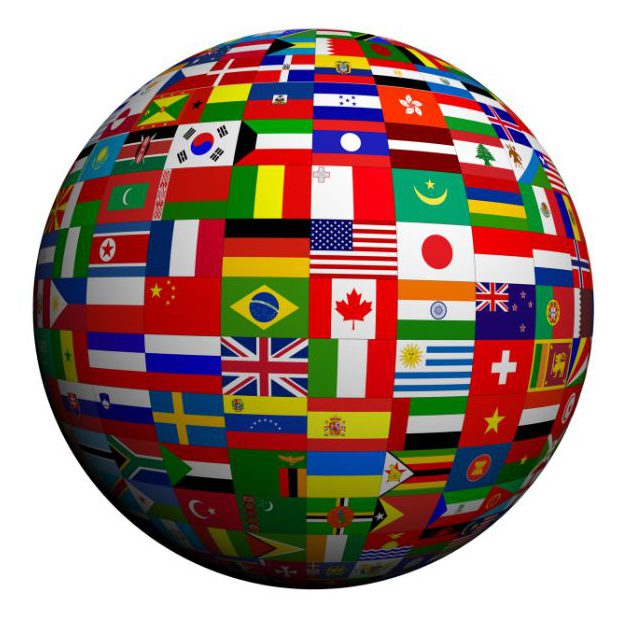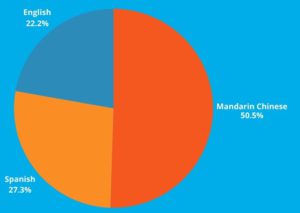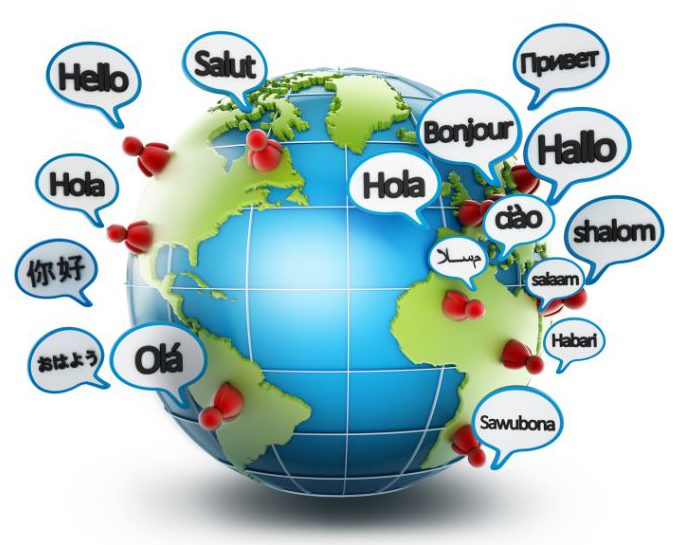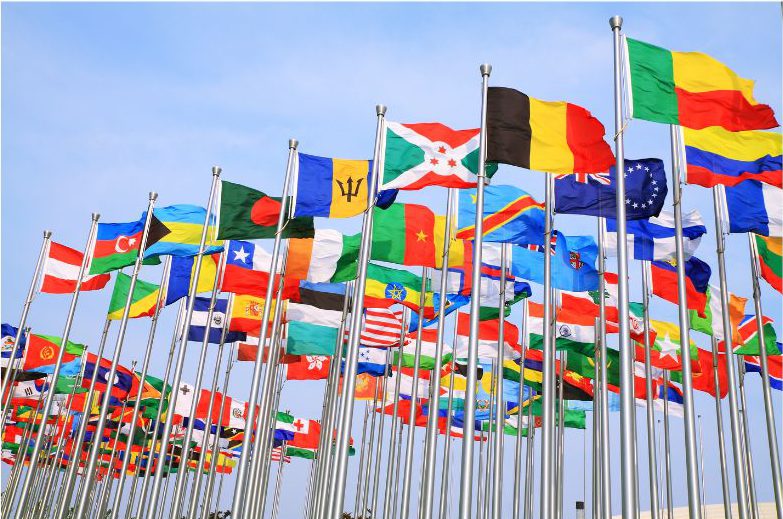
Best language to learn for a global career: Which ones open the most doors?
Posted by
For today’s teens, the concept of a “local job” is quickly becoming outdated. The globalized world, fueled by digital connections and multinational commerce, means national borders don’t have to confine career paths. Your future success might even rely on your ability to understand other cultures and navigate diverse markets. The question for forward-thinking teens and their parents isn’t if a second language is necessary, but which language offers the greatest advantage. Choosing the best language to learn is one of the most important decisions you can make to invest in a global career. This choice is a long-term investment, and one that will set you down a road of a lifetime of learning. Determining the best language to learn requires careful thought as you blend your personal interests with the realities of economics and diplomacy.
The process of learning languages is professionally and personally transformative. Learning a foreign language changes how you think, how you connect, and how you view the world. Keep reading to understand the cognitive and financial benefits of learning new languages and identify the top contenders that will give you a competitive edge in the 21st-century job market.
- How many languages are there in the world?
- Why learn a foreign language?
- What's the best language to learn for a global career?
- Top languages to learn
- How to learn a language: 5 tips
- Best language to learn for a global career: takeaways
How many languages are there in the world?
According to Ethnologue, an online database of world languages, 7,159 languages are currently spoken today. The number fluctuates somewhat as some languages (over 3,000) are endangered and others are constantly evolving.
Of these thousands of languages, only a tiny fraction dominates global communication, commerce, and diplomacy. Small communities speak the overwhelming majority of languages, and many face extinction as the number of speakers dies or other languages become dominant. For example, between 350 and 430 different languages are spoken in the U.S. The country currently has about 167 Native American languages, but by 2050, linguists anticipate only 20 of those indigenous languages will survive.
What is the most common language?
There’s no simple answer to this seemingly innocuous question because its answer depends on the metric you use.

By native speakers (L1)
If you only count the number of people who grew up speaking a language (native speakers), the ranking is pretty straightforward.
Mandarin Chinese leads the pack, with well over 900 million speakers — a dominance attributable to China’s massive population. If you’re interested in international business, Mandarin might be the best language to learn.
Spanish follows close behind, with approximately 485 to 500 million native speakers, primarily in Spain, Mexico, and Central and South America. With its global reach and cultural richness, Spanish is often seen as the best language to learn for anyone seeking both practicality and connection.
English typically ranks third, with about 370 to 400 million speakers. Many argue that English remains the best language to learn for access to global media and business opportunities.
By total speakers (L1 + L2)
If you look at the total global influence — the measure most relevant to international business and diplomacy — the picture changes dramatically.
- English becomes the unrivaled global leader, with an estimated 1.5 billion or more speakers (including people who speak it as a second or foreign language). English is the “lingua franca” of international business, aviation, science, computing, and diplomacy.
- Mandarin Chinese and Spanish remain critically important, each with total speaker counts pushing beyond half a billion, solidifying their status as essential global languages.
Why learn a foreign language?
Teens often engage with languages other than their own through required school courses, language learning apps, music, TV, and more. But is the effort required to actually learn a foreign language to the point of fluency really worth the time (and sometimes tears) when English is already so dominant? The answer is a resounding yes. The benefits of learning new languages extend beyond job titles and paychecks; they’re personal, cognitive, and natural.
Cognitive benefits: A brain workout
One of the most immediate and profound impacts of learning languages is the mental boost you get. When you learn a foreign language, your brain has to actively grapple, analyze, and use new grammatical rules, syntax, and vocabulary. This mental workout strengthens and grows your brain, like working out at the gym. Studies have shown that learning new languages can increase grey and white matter density, which boosts your brain’s processing power.
 Enhanced executive function
Enhanced executive function
Learning languages (and using them) keeps your mind sharp and adaptable. Bilingual speakers constantly switch between languages, training their brains to filter distractions, manage competing information, and concentrate on the current task. This switching strengthens executive function, the set of mental skills that include planning, organization, and problem-solving.
Delayed onset of dementia
The most compelling reason for learning languages is the long-term health benefits it offers. Research suggests that consistently speaking a second language may delay the start of neurodegenerative diseases like Alzheimer’s and dementia by several years.
Increased earning potential
In a global market, learning new languages and achieving fluency isn’t a niche skill but a valued competitive asset. Data shows that employees proficient in two or more languages often earn more than their monolingual colleagues — up to 19% more! The best language to learn often translates into the language that pays best in your chosen field.
More job opportunities
Companies operating internationally (finance, technology, diplomacy, humanitarian aid) often seek multilingual talent. Learning languages can elevate your resume above other candidates.
Deeper client relationships
The ability to speak a client’s native tongue cultivates trust and rapport that a translator can’t always replicate. It’s a sign of respect that can help facilitate negotiations and solidify business relationships on the international stage. In this case, the best language to learn is whichever language the majority of your clients and business partners speak.
Level up your college application
If you’re eyeing a selective university, you might want to learn a foreign language. Fluency in a second language showcases your discipline, intellectual curiosity, and a well-rounded education (qualities that college admissions officers want to see).
True global citizenship
A language is a lens into a new culture. When you commit to learning languages outside of your own, you gain a deeper understanding that you won’t find in textbooks. You learn to see the world from a different cultural perspective, improving your empathy and increasing your adaptability and flexibility — essential soft skills for future leaders.
The best language to learn is one that you can put to use outside of your career. Imagine reading Don Quixote in the original Spanish, watching Japanese anime without subtitles, or understanding political nuances in a French newspaper. Your world expands infinitely when you gain direct access to the literature, music, and media of another culture.

What’s the best language to learn for a global career?
The best language to learn to expand your social circle may be the one spoken by your local community. However, the quest for the most useful language to learn for your career is complex, as “utility” depends heavily on individual circumstances. For a global career advantage, you can define utility by:
- Economic strength. Is the language spoken in nations with large, growing, or stable economies (e.g., German, Mandarin)?
- Geopolitical importance. Is the language used in international diplomacy, major organizations like the United Nations or the World Trade Organization, or politically vital regions (e.g., French, Arabic, Russian)?
- Speaker count and reach. Does the language have a vast number of speakers and a widespread geographical reach (e.g., Spanish)?
- Competitive advantage (supply and demand). Is there a high demand for speakers of this language but a low supply of proficient speakers (e.g., Arabic, Portuguese)?
Use these criteria — and what you think you’d like to do after earning your degree — to help you narrow down your decision on the best language to learn.
Top languages to learn
Determining the best language to learn requires looking at both global trends and personal interests. While English remains a baseline for international careers, mastering one of the following languages will help uncover and expand your opportunities.
1. Mandarin Chinese
Mandarin, with over a billion speakers, is the linguistic representative of a global superpower. China is arguably the world’s leading manufacturer and one of the largest nations. Companies across the globe, from the Silicon Valley tech giants to European luxury goods manufacturers, have significant operations and interests in China.
- Career pathways: International finance, supply chain management, technology (especially AI and manufacturing), government, and foreign service.
- The learning curve: Mandarin is both a best language to learn and one of the most challenging to learn. For native English speakers, its tonal nature and complex character-based writing system can be difficult to grasp. Expect to spend at least 2,200 class hours for working proficiency. But high difficulty often means high reward and less competition.
2. Spanish
Many people consider Spanish the best language to learn because it’s widely spoken across multiple continents. Spanish is the second-most spoken language by native speakers worldwide and carries great importance in North, Central, and South America, with a growing presence in the United States.
- Career pathways: Healthcare, real estate, domestic business (especially in the U.S.), tourism, international relations, and energy.
- The learning curve: Spanish is considered one of the easier languages for English speakers to learn, as it shares a Latin-based alphabet and numerous cognates (words with the same “ancestor”). Students with a strong foundation can reach working proficiency fairly quickly (around 600-750 class hours), making Spanish a best foreign language choice for a fast return on investment.
3. German
Germany boasts the EU’s largest economy, and it’s a global leader in high-tech manufacturing, engineering, and finance. German is also the most widely spoken native language in Europe, making it the best language to learn for connecting and working across multiple EU nations.
- Career pathways: Engineering (automotive, mechanical), international baking (Frankfurt is a world finance center), renewable energy, and scientific research. Germany’s commitment to scientific innovation means that much of the world’s cutting-edge academic work is conducted or published in German.
- The learning curve: While German’s grammar is rather complex (especially the noun case system), the language is structurally similar to English as both are Germanic languages. This similarity makes vocabulary acquisition smoother than for tonal or character-based languages.
4. French
French is often called the best language to learn for those pursuing work in diplomacy or international relations. French is the official language in the United Nations, NATO, the World Trade Organization (WTO), and the International Olympic Committee. Approximately 300 million people in dozens of countries across Europe, Africa, and North America (Quebec and Montreal) speak French, making it one of the best foreign languages for accessing future growth markets.
- Career pathways: International affairs, diplomatic service, non-governmental organizations (NGOs), humanitarian aid, and sectors like fashion, culinary arts, and tourism.
- The learning curve: Like Spanish, French is a Romance language, so it’s relatively accessible for English speakers (600-750 hours). It’s an excellent choice for a well-rounded academic and diplomatic career path.
5. Arabic
Arabic is the native language of over 25 countries in the Middle East and North Africa, a region critical to global energy supply, geopolitics, and emerging finance hubs. For this reason, professionals interested in international business believe Arabic is the best language to learn to engage with emerging markets. While the media and official documents use Modern Standard Arabic (MSA), the spoken dialects vary widely.
- Career pathways: Intelligence and government service, energy (oil and gas), international finance, journalism, and defense. There’s a documented shortage of Arabic-speaking professionals in North America and Europe, creating a significant and valuable niche.
- The learning curve: Arabic is considered difficult because of its unique script, root-based morphology, and divergence between MSA and dialects. It requires about 2,200 class hours to learn, but the ROI, particularly in government and specialized business sectors, is very high.
6. Portuguese
Portuguese is one of the best foreign languages for doing business in Latin America and Africa. It’s the official language of several countries with rapidly growing economies, including Brazil and Angola; over 250 million people worldwide speak it.
- Career pathways: Banking, tourism, agriculture, and international trade focused on emerging South American and African markets. Portuguese fluency provides a greater niche advantage in organizations focused on these regions compared to the ubiquitous Spanish market.
- The learning curve: Another Romance language, Portuguese is typically easier for English speakers to learn than German or Mandarin. Many Spanish speakers find Portuguese the next best language to learn because many words and sentence structures overlap.
Other strategic languages to learn
- Japanese: Essential for careers in robotics, consumer electronics, and high-tech manufacturing, Japanese is one of the best foreign languages to learn to tap into Japan’s tech and culture.
- Hindi: The best language to learn for engaging with India, which boasts one of the world’s fastest-growing economies and the largest consumer market for goods and services.
- Russian: Important for careers in Eurasian politics, international energy (natural resources), and defense. It remains a primary language in the former Soviet Republics.
So, which of these is the best foreign language for a global career? The truth is, the best language to learn is one you’re most likely to stick with and achieve proficiency in. Learning languages isn’t easy — it takes hours of dedicated practice and repetition — but committing to one (or two, or three!) will enrich your life and mind in countless ways.
How to learn a language: 5 tips
Choosing the best foreign language is only the first step; the commitment to studying and practicing to reach proficiency is the real journey. Finding the best way to learn a language involves strategy and consistency. Here are five practical tips for achieving fluency.
- Embrace immersion, even at home. The best way to learn a foreign language is to immerse yourself fully. If you can study abroad for a summer, do a school exchange, or take a gap year, take that opportunity — it’s the quickest route to fluency. If those aren’t options, you can also replicate complete immersion at home! Commit to speaking the language with your friends, family, or classmates for a set period each week. Change your phone's language settings, watch movies and TV shows in your target language, and listen to foreign music and podcasts.
- Consistency over intensity. How to learn a language is less about eight hours of cramming and more about daily exposure. Commit to 20-30 minutes of daily practice rather than one longer weekly session. Consistent, small interactions with the language prevent your brain from forgetting and reinforce neural pathways. Use flashcards during a break, or listen to a podcast while you’re walking, working out, or doing chores.
- Use language-learning apps and technology. Modern technology has revolutionized how kids and adults alike learn a foreign language. Integrating a structured learning app into your daily routine will help you build vocabulary and understand basic grammatical structure. Language learning apps like Duolingo, Babbel, and Mango Languages offer structured content that’s often gamified to keep you engaged. Look for language exchange apps like Tandem or HelloTalk, where you can chat with native speakers who are learning your language and engage in authentic communication.
- Focus on real-world conversation, not just grammar. Many students get bogged down learning languages, trying to master every conjugation rule before speaking. Don’t wait for perfection. Communication is your goal. Mistakes are a necessary part of learning languages. Native speakers appreciate the effort, not flawless grammar. Find opportunities to talk to native speakers in class, online, or at cultural events. This active retrieval practice is the best way to learn a language.
- Connect the language to your interests. Sustained motivation is the key to success. As you take steps to learn a foreign language, find ways to connect your language learning to something you already love.
- Coding/gaming: Read technical blogs or forums in German or Japanese.
- Art/literature: Read novels or poems in French or Spanish.
- Business/finance: Read international news in Mandarin or Arabic.
Best language to learn for a global career: Takeaways
Deciding the best language to learn for a global career is personal and strategic. If you’re mapping out your future in this interconnected world, the takeaway is simple.
- English is the foundation. Because of its widespread applicability, English is often considered the best language to learn for non-native speakers. While proficiency in English is a given in global business, it’s not enough for a native English speaker to be competitive in the worldwide market.
- The big three languages for economic power? Mandarin Chinese (Asia’s financial future), Spanish (North and South American markets), and German (Europe’s driver) offer the clearest path to high-value international careers.
- Utility is relative. The best language to learn is the one you’ll put to use. Your personal career interests should guide your choice. Hoping for a future in diplomacy? Choose French or Arabic. Want a career in South American trade? Learn Portuguese.
- Any second language is an investment. The cognitive benefits and commitment it takes to learn a foreign language will benefit you regardless of which one you choose. Bilingualism (or multilingualism) signals adaptability, intelligence, and cultural awareness — and learning languages is a sure-fire way to strengthen your mind and improve mental flexibility.
By choosing one of these high-impact languages and committing to a consistent, immersive learning process, you’re studying a subject but also building a bridge to your future self — a global citizen ready to seize the most exciting opportunities the world offers.
Blog Categories
- Career Advice
- College Admissions
- Colleges & Universities
- Financial Aid and Scholarships
- For Counselors
- For Parents
- For Students
- Gap Years
- Mental Health and Wellness
- Online Learning
- Performing and Visual Arts
- STEM Majors and More
- Summer Programs
- Teen Volunteering
- Trade & Vocational Schools
- Tutoring & Test Prep

Organization with listings on TeenLife? Login here
Register for Free
We’re here to help you find your best-fit teen-centered academic and enrichment opportunities.
Forgot Password
"*" indicates required fields

 Enhanced executive function
Enhanced executive function







